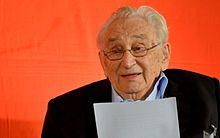Egon Bahr
| Egon Bahr | |
|---|---|

Egon Bahr delivering a speech at an SPD conference in 2014.
|
|
| Federal Minister for Special Affairs of Germany | |
|
In office 1972–1974 |
|
| Minister for Economic Cooperation | |
|
In office 1974–1976 |
|
| Preceded by | Erhard Eppler |
| Succeeded by | Marie Schlei |
| Personal details | |
| Born |
Egon Karl-Heinz Bahr 18 March 1922 Treffurt, Thuringia, Weimar Republic |
| Died | 19 August 2015 (aged 93) Berlin, Germany |
| Political party | SPD |
| Occupation | Politician, statesman, journalist |
| Religion | Lutheranism |
Egon Karl-Heinz Bahr (18 March 1922 – 19 August 2015) was a German SPD politician.
The former journalist was the creator of the "Ostpolitik" promoted by West German Chancellor Willy Brandt, for whom he served as Secretary of the Chancellor's Office from 1969 until 1972. Between 1972 and 1990 he was an MP in the Bundestag of the Federal Republic of Germany and from 1972 until 1976 was also a Minister of the Federal Government.
Bahr was a key figure in multiple negotiation sessions between not only East and West Germany, but also Germany and the Soviets. In addition to his instrumental role in Ostpolitik, Bahr was also an influential voice in negotiating the Treaty of Moscow, the Treaty of Warsaw, the Transit Treaty of 1971 and the Basic Treaty of 1972.
Bahr was born in Treffurt, Thuringia, the son of Hedwig and Karl Bahr, a high school teacher. After completing his secondary education in 1940, Bahr continued his education as an industrial specialist at the Rheinmetall-Borsig armament corporation in Berlin. During World War II, Bahr served as a soldier in the Wehrmacht from 1942 until 1944, ultimately in the capacity of “Fahnenjunker” (cadet) in the Luftkriegsschule VI in Kitzingen. He was, however, demoted after being accused of being non-Aryan (on account of his Jewish grandmother) and, thus, having “sneaked into the Wehrmacht”. Thereafter, he received a posting as an armaments worker at Rheinmetall-Borsig.
...
Wikipedia
